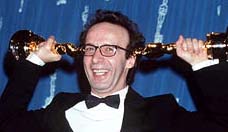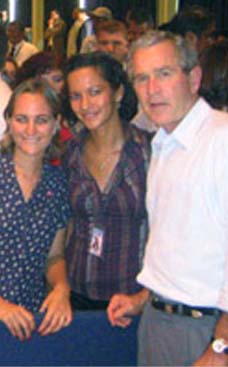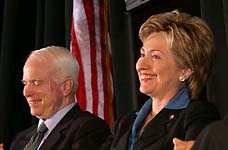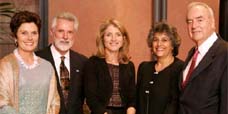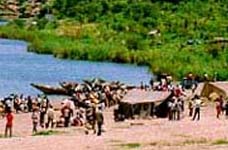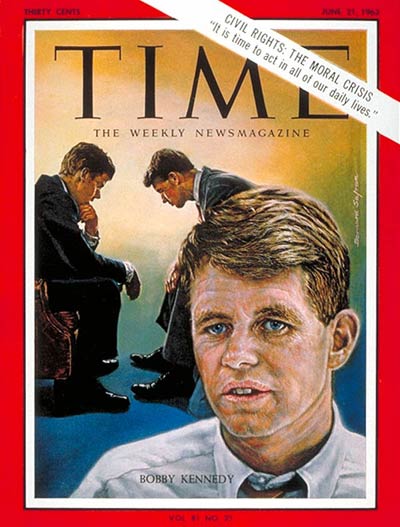
"Few men are willing to brave the disapproval of their fellows, the censure of their colleagues, the wrath of their society. Moral courage is a rarer commodity than bravery in battle or great intelligence. Yet it is the one essential, vital quality for those who seek to change the world which yields most painfully to change. Aristotle tells us "At the Olympic games it is not the finest or the strongest men who are crowned, but those who enter the lists. . .so too in the life of the honorable and the good it is they who act rightly who win the prize." I believe that in this generation those with the courage to enter the conflict will find themselves with companions in every corner of the world."
Robert Kennedy would have celebrated his 80th birthday last Sunday if he had not been assassinated
Robert F. Kennedy's Day of Affirmation Address, Capetown, south Africa
June 6, 1966
Mr. Chancellor, Mr. Vice Chancellor, Professor Robertson, Mr. Diamond, Mr. Daniel, Ladies and Gentlemen:
I come here this evening because of my deep interest and affection for a land settled by the Dutch in the mid-seventeenth century, then taken over by the British, and at last independent; a land in which the native inhabitants were at first subdued, but relations with whom remain a problem to this day; a land which defined itself on a hostile frontier; a land which has tamed rich natural resources through the energetic application of modern technology; a land which was once the importer of slaves, and now must struggle to wipe out the last traces of that former bondage. I refer, of course, to the United States of America.
But I am glad to come here, and my wife and I and all of our party are glad to come here to South Africa, and we are glad to come here to Capetown. I am already greatly enjoying my visit here. I am making an effort to meet and exchange views with people of all walks of life, and all segments of South African opinion -- including those who represent the views of the government. Today I am glad to meet with the National Union of South African Students. For a decade, NUSAS has stood and worked for the principles of the Universal Declaration of Human Rights -- principles which embody the collective hopes of men of good will around the globe.
Your work, at home and in international student affairs, has brought great credit to yourselves and your country. I know the National Student Association in the United States feels a particularly close relationship with this organization. And I wish to thank especially Mr. Ian Robertson, who first extended this invitation on behalf of NUSAS, I wish to thank him for his kindness to me in inviting me. I am very sorry that he can not be with us here this evening. I was happy to have had the opportunity to meet and speak with him earlier this evening, and I presented him with a copy of Profiles in Courage, which was a book written by President John Kennedy and was signed to him by President Kennedy's widow, Mrs. John Kennedy.
This is a Day of Affirmation -- a celebration of liberty. We stand here in the name of freedom.
At the heart of that western freedom and democracy is the belief that the individual man, the child of God, is the touchstone of value, and all society, all groups, and states, exist for that person's benefit. Therefore the enlargement of liberty for individual human beings must be the supreme goal and the abiding practice of any western society.
The first element of this individual liberty is the freedom of speech; the right to express and communicate ideas, to set oneself apart from the dumb beasts of field and forest; the right to recall governments to their duties and obligations; above all, the right to affirm one's membership and allegiance to the body politic -- to society -- to the men with whom we share our land, our heritage and our children's future.
Hand in hand with freedom of speech goes the power to be heard -- to share in the decisions of government which shape men's lives. Everything that makes man's lives worthwhile -- family, work, education, a place to rear one's children and a place to rest one's head -- all this depends on the decisions of government; all can be swept away by a government which does not heed the demands of its people, and I mean all of its people. Therefore, the essential humanity of man can be protected and preserved only where the government must answer -- not just to the wealthy; not just to those of a particular religion, not just to those of a particular race; but to all of the people.
And even government by the consent of the governed, as in our own Constitution, must be limited in its power to act against its people: so that there may be no interference with the right to worship, but also no interference with the security of the home; no arbitrary imposition of pains or penalties on an ordinary citizen by officials high or low; no restriction on the freedom of men to seek education or to seek work or opportunity of any kind, so that each man may become all that he is capable of becoming.
These are the sacred rights of western society. These were the essential differences between us and Nazi Germany as they were between Athens and Persia.
They are the essences of our differences with communism today. I am unalterably opposed to communism because it exalts the state over the individual and over the family, and because its system contains a lack of freedom of speech, of protest, of religion, and of the press, which is characteristic of a totalitarian regime. The way of opposition to communism, however, is not to imitate its dictatorship, but to enlarge individual human freedom. There are those in every land who would label as "communist" every threat to their privilege. But may I say to you , as I have seen on my travels in all sections of the world, reform is not communism. And the denial of freedom, in whatever name, only strengthens the very communism it claims to oppose.
Many nations have set forth their own definitions and declarations of these principles. And there have often been wide and tragic gaps between promise and performance, ideal and reality. Yet the great ideals have constantly recalled us to our own duties. And -- with painful slowness -- we in the United States have extended and enlarged the meaning and the practice of freedom to all of our people.
For two centuries, my own country has struggled to overcome the self-imposed handicap of prejudice and discrimination based on nationality, on social class or race -- discrimination profoundly repugnant to the theory and to the command of our Constitution. Even as my father grew up in Boston, Massachusetts, signs told him that "No Irish Need Apply". Two generations later, President Kennedy became the first Irish Catholic, and the first Catholic, to head the nation; but how many men of ability had, before 1961, been denied the opportunity to contribute to the nation's progress because they were Catholic, or because they were of Irish extraction? How many sons of Italian or Jewish or Polish parents slumbered in the slums -- untaught, unlearned, their potential lost forever to our nation and to the human race? Even today, what price will we pay before we have assured full opportunity to millions of Negro Americans?
In the last five years we have done more to assure equality to our Negro citizens and to help the deprived, both white and black, than in the hundred years before that time. But much, much more remains to be done.
For there are millions of Negroes untrained for the simplest of jobs, and thousands every day denied their full and equal rights under the law; and the violence of the disinherited, the insulted and the injured, looms over the streets of Harlem and of Watts and Southside Chicago.
But a Negro American trains as an astronaut, one of mankind's first explorers into outer space; another is the chief barrister of the United States government, and dozens sit on the benches of our court; and another, Dr. Martin Luther King, is the second man of African descent to win the Nobel Peace Prize for his non-violent efforts for social justice between all of the races.
We have passed laws prohibiting discrimination in education, in employment, in housing; but these laws alone cannot overcome the heritage of centuries -- of broken families and stunted children, and poverty and degradation and pain.
So the road toward equality of freedom is not easy, and great cost and danger march alongside all of us. We are committed to peaceful and non-violent change and that is important for all to understand -- though change is unsettling. Still, even in the turbulence of protest and struggle is greater hope for the future, as men learn to claim and achieve for themselves the rights formerly petitioned from others.
And most important of all, all the panoply of government power has been committed to the goal of equality before the law -- as we are now committing ourselves to achievement of equal opportunity in fact.
We must recognize the full human equality of all of our people -- before God, before the law, and in the councils of government. We must do this, not because it is economically advantageous -- although it is; not because the laws of God command it -- although they do; not because people in other lands wish it so. We must do it for the single and fundamental reason that it is the right thing to do.
We recognize that there are problems and obstacles before the fulfillment of these ideals in the United States as we recognize that other nations, in Latin America and in Asia and in Africa have their own political, economic, and social problems, their unique barriers to the elimination of injustices.
In some, there is concern that change will submerge the rights of a minority, particularly where that minority is of a different race than that of the majority. We in the United States believe in the protection of minorities; we recognize the contributions that they can make and the leadership they can provide; and we do not believe that any people -- whether majority or minority, or individual human beings -- are "expendable" in the cause of theory or policy. We recognize also that justice between men and nations is imperfect, and that humanity sometimes progresses very slowly indeed.
All do not develop in the same manner and at the same pace. Nations, like men, often march to the beat of different drummers, and the precise solutions of the United States can neither be dictated nor transplanted to others, and that is not our intention. What is important however is that all nations must march toward increasing freedom; toward justice for all; toward a society strong and flexible enough to meet the demands of all of its people, whatever their race, and the demands of a world of immense and dizzying change that face us all.
In a few hours, the plane that brought me to this country crossed over oceans and countries which have been a crucible of human history. In minutes we traced migrations of men over thousands of years; seconds, the briefest glimpse, and we passed battlefields on which millions of men once struggled and died. We could see no national boundaries, no vast gulfs or high walls dividing people from people; only nature and the works of man -- homes and factories and farms -- everywhere reflecting man's common effort to enrich his life. Everywhere new technology and communications brings men and nations closer together, the concerns of one inevitably become the concerns of all. And our new closeness is stripping away the false masks, the illusion of differences which is at the root of injustice and hate and war. Only earthbound man still clings to the dark and poisoning superstition that his world is bounded by the nearest hill, his universe ends at river's shore, his common humanity is enclosed in the tight circle of those who share his town or his views and the color of his skin.
It is your job, the task of the young people in this world to strip the last remnants of that ancient, cruel belief from the civilization of man.
Each nation has different obstacles and different goals, shaped by the vagaries of history and of experience. Yet as I talk to young people around the world I am impressed not by the diversity but by the closeness of their goals, their desires, and their concerns and their hope for the future. There is discrimination in New York, the racial inequality of apartheid in South Africa, and serfdom in the mountains of Peru. People starve to death in the streets of India; a former Prime Minister is summarily executed in the Congo; intellectuals go to jail in Russia; and thousands are slaughtered in Indonesia; wealth is lavished on armaments everywhere in the world. These are different evils; but they are the common works of man. They reflect the imperfections of human justice, the inadequacy of human compassion, the defectiveness of our sensibility toward the sufferings of our fellows; they mark the limit of our ability to use knowledge for the well-being of our fellow human beings throughout the world. And therefore they call upon common qualities of conscience and indignation, a shared determination to wipe away the unnecessary sufferings of our fellow human beings at home and around the world.
It is these qualities which make of our youth today the only true international community. More than this I think that we could agree on what kind of a world we want to build. It would be a world of independent nations, moving toward international community, each of which protected and respected the basic human freedoms. It would be a world which demanded of each government that it accept its responsibility to insure social justice. It would be a world of constantly accelerating economic progress -- not material welfare as an end in of itself, but as a means to liberate the capacity of every human being to pursue his talents and to pursue his hopes. It would, in short, be a world that we would all be proud to have built.
Just to the North of here are lands of challenge and of opportunity -- rich in natural resources, land and minerals and people. Yet they are also lands confronted by the greatest odds -- overwhelming ignorance, internal tensions and strife, and great obstacles of climate and geography. Many of these nations, as colonies, were oppressed and were exploited. Yet they have not estranged themselves from the broad traditions of the West; they are hoping and they are gambling their progress and their stability on the chance that we will meet our responsibilities to them, to help them overcome their poverty.
In the world we would like to build, South Africa could play an outstanding role, and a role of leadership in that effort. This country is without question a preeminent repository of the wealth and the knowledge and the skill of the continent. Here are the greater part of Africa's research scientists and steel production, most of it reservoirs of coal and of electric power. Many South Africans have made major contributions to African technical development and world science; the names of some are known wherever men seek to eliminate the ravages of tropical disease and of pestilence. In your faculties and councils, here in this very audience, are hundreds and thousands of men and women who could transform the lives of millions for all time to come.
But the help and leadership of South Africa or of the United States cannot be accepted if we -- within our own countries or in our relationships with others -- deny individual integrity, human dignity, and the common humanity of man. If we would lead outside our own borders; if we would help those who need our assistance; if we would meet our responsibilities to mankind; we must first, all of us, demolish the borders which history has erected between men within our own nations -- barriers of race and religion, social class and ignorance.
Our answer is the world's hope; it is to rely on youth. The cruelties and the obstacles of this swiftly changing planet will not yield to obsolete dogmas and outworn slogans. It cannot be moved by those who cling to a present which is already dying, who prefer the illusion of security to the excitement and danger which comes with even the most peaceful progress. This world demands the qualities of youth: not a time of life but a state of mind, a temper of the will, a quality of imagination, a predominance of courage over timidity, of the appetite for adventure over the life of ease -- a man like the Chancellor of this University. It is a revolutionary world that we all live in; and thus, as I have said in Latin America and Asia and in Europe and in my own country, the United States, it is the young people who must take the lead. Thus you, and your young compatriots everywhere have had thrust upon you a greater burden of responsibility than any generation that has ever lived.
"There is," said an Italian philosopher, "nothing more difficult to take in hand, more perilous to conduct, or more uncertain in its success than to take the lead in the introduction of a new order of things." Yet this is the measure of the task of your generation and the road is strewn with many dangers.
First is the danger of futility; the belief there is nothing one man or one woman cando against the enormous array of the world's ills -- against misery, against ignorance, or injustice and violence. Yet many of the world's great movements, of thought and action, have flowed from the work of a single man. A young monk began the Protestant reformation, a young general extended an empire from Macedonia to the borders of the earth, and a young woman reclaimed the territory of France. It was a young Italian explorer who discovered the New /world, and 32 year old Thomas Jefferson who proclaimed that all men are created equal. "Give me a place to stand," said Archimedes, "and I will move the world." These men moved the world, and so can we all. Few will have the greatness to bend history; but each of us can work to change a small portion of the events, and in the total of all these acts will be written the history of this generation. Thousands of Peace Corps volunteers are making a difference in the isolated villages and the city slums of dozens of countries. Thousands of unknown men and women in Europe resisted the occupation of the Nazis and many died, but all added to the ultimate strength and freedom of their countries. It is from numberless diverse acts of courage such as these that the belief that human history is thus shaped. Each time a man stands up for an ideal, or acts to improve the lot of others, or strikes out against injustice, he sends forth a tiny ripple of hope, and crossing each other from a million different centers of energy and daring those ripples build a current which can sweep down the mightiest walls of oppression and resistance.
"If Athens shall appear great to you," said Pericles, "consider then that her glories were purchased by valiant men, and by men who learned their duty." That is the source of all greatness in all societies, and it is the key to progress in our own time.
The second danger is that of expediency; of those who say that hopes and beliefs must bend before immediate necessities. Of course if we must act effectively we must deal with the world as it is. We must get things done. But if there was one thing that President Kennedy stood for that touched the most profound feeling of young people across the world, it was the belief that idealism, high aspiration and deep convictions are not incompatible with the most practical and efficient of programs -- that there is no basic inconsistency between ideals and realistic possibilities -- no separation between the deepest desires of heart and of mind and the rational application of human effort to human problems. It is not realistic or hard-headed to solve problems and take action unguided by ultimate moral aims and values, although we all know some who claim that it is so. In my judgement, it is thoughtless folly. For it ignores the realities of human faith and of passion and of belief; forces ultimately more powerful than all the calculations of our economists or of our generals. Of course to adhere to standards, to idealism, to vision in the face of immediate dangers takes great courage and takes self-confidence. But we also know that only those who dare to fail greatly, can ever achieve greatly.
It is this new idealism which is also, I believe, the common heritage of a generation which has learned that while efficiency can lead to the camps at Auschwitz, or the streets of Budapest, only the ideals of humanity and love can climb the hills of the Acropolis.
A third danger is timidity. Few men are willing to brave the disapproval of their fellows, the censure of their colleagues, the wrath of their society. Moral courage is a rarer commodity than bravery in battle or great intelligence. Yet it is the one essential, vital quality for those who seek to change the world which yields most painfully to change. Aristotle tells us "At the Olympic games it is not the finest or the strongest men who are crowned, but those who enter the lists. . .so too in the life of the honorable and the good it is they who act rightly who win the prize." I believe that in this generation those with the courage to enter the conflict will find themselves with companions in every corner of the world.
For the fortunate amongst us, the fourth danger is comfort; the temptation to follow the easy and familiar path of personal ambition and financial success so grandly spread before those who have the privelege of an education. But that is not the road history has marked out for us. There is a Chinese curse which says "May he live in interesting times." Like it or not, we live in interesting times. They are times of danger and uncertainty; but they are also the most creative of any time in the history of mankind. And everyone here will ultimately be judged -- will ultimately judge himself -- on the effort he has contributed to building a new world society and the extent to which his ideals and goals have shaped that effort.
So we part, I to my country and you to remain. We are -- if a man of forty can claim the privelege -- fellow members of the world's largest younger generation. Each of us have our own work to do. I know at times you must feel very alone with your problems and with your difficulties. But I want to say how impressed I am with what you stand for and for the effort you are making; and I say this not just for myself, but men and women all over the world. And I hope you will often take heart from the knowledge that you are joined with your fellow young people in every land, they struggling with their problems and you with yours, but all joined in a common purpose; that, like the young people of my own country and of every country that I have visited, you are all in many ways more closely united to the brothers of your time than to the older generation in any of these nations; you are determined to build a better future. President Kennedy was speaking to the young people of America, but beyond them to young people everywhere, when he said "The energy, the faith, the devotion which we bring to this endeavor will light our country and all who serve it -- and the glow from that fire can truly light the world."
And, he added, "With a good conscience our only sure reward, with history the final judge of our deeds, let us go forth and lead the land we love, asking His blessing and His help, but knowing that here on earth God's work must truly be our own."
I thank you.
